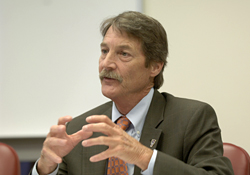New Business Structure Takes Shape

If you’re only vaguely aware of something called “strategic realignment” at NC State, don’t worry—the concept is about to come into focus. In just a few months, NC State will begin rolling out a new organizational structure for delivering business services.
Eventually, most finance and human resource transactions will be lifted out of individual units and colleges—along with many of the people who perform them—and moved to specialty centers, called Business Operations Centers, or BOCs.
The first BOC, scheduled to open in May, will coordinate all the activities involved in processing new hires. The next two centers will open in the fall, one to handle travel transactions and the other to handle employee recruitment and selection. Next year, four BOCs will be established to handle, respectively, time reporting, purchasing and payables, position administration and receivables.
“We’re ready to move forward,” says Scott Inkley, executive director of University Business Operations. “We’re ready to make it this happen.”
The Case for Shared Services
It’s easy to make the case for this new business structure, called shared services, to university leaders. After all, the realignment is expected to reduce NC State’s operating expenditures by 16 percent.

The bigger challenge is to rally everyone else on campus around the concept. To do that, Inkley is on a campus-wide tour, sitting down with deans, department heads, directors, faculty members and staff to explain the benefits of shared services.
Faculty and staff alike will appreciate all the work that’s gone into reducing the complexity of common business processes, he says. Since last summer, cross-functional teams of finance and HR experts have been digging into dozens of processes, looking for ways to automate, streamline, simplify and standardize transactions. Although the work is far from done, Inkley is satisfied with the progress so far.
“Thanks to this massive volunteer effort, we’re making excellent progress in identifying and eliminating what we call pain points—unnecessary steps that slow things down without adding any real value,” he says.
For example, a review found that the travel authorization process varies widely across the university, involving as many as 129 separate “touch points.” A new standardized process will eliminate more than three-quarters of these steps.
Easing the Burden
Inkley is quick to make the point to deans, department heads and faculty members that NC State is undertaking this enormously complex realignment effort primarily for them.

“To be honest, we’re not doing this because people are unhappy with the quality of business services on campus,” he says. “But the status quo simply isn’t sustainable. Budget cuts have already reduced the number of employees working in finance and HR. Unless we act now and find ways to do more with less, we’re likely to face a real crisis in the coming years.”
Some departments are already seeing an impact from the reduction in state funding over the past few years. The elimination of 600 positions in 2011 didn’t eliminate the workload; it just shifted it to the remaining employees, including faculty members.
“A recent study found that scientists already spend 50 percent of their time on administrative tasks,” Inkley says. “If we’re serious about protecting the academic core of the university, we need to reduce this burden on faculty, not increase it.”
Inkley’s message for employees who work in finance and HR roles is equally direct. NC State’s top three business operations expenditures are labor-related. The only way to protect employees in a time of diminishing state support for higher education is to make the university more efficient.
But there are other benefits.
Focus on Quality
“We’re not just focused on improving processes,” Inkley says. “We’re committed to building a high-performing organization from the ground up and creating a positive, rewarding and energetic place to work.”
Employees who move into the BOCs will receive extensive training so they become experts in a particular area, like travel, instead of generalists in the whole range of business services—the current expectation in many units.
That, in turn, will help them provide better service to customers across campus.

Inkley continues to hammer on one of his guiding principles: the importance of putting quality at the center of the realignment. He’s suggested to the implementation team leading the project that University Business Operations should aspire to meet the Baldrige Criteria for Performance Excellence, and ultimately win a Malcolm Baldrige National Quality Award.
It’s an ambitious goal. To receive the Baldrige Award, an organization must be a national role model for organizational management with a system that ensures continuous improvement, efficient and effective operations and customer engagement.
Those ideals will be built into the framework of the BOCs. A plan, approved by the implementation team in January and endorsed by the chancellor, calls for the development of a wide-ranging quality control system. Each center will have customer service liaisons and cross-functional customer service teams on site. And University Business Operations will track multiple performance measures for each center, including cycle times, cost per transaction and case load ratios.
A permanent service advisory panel will be established to ensure that best practices are followed, and regular focus groups will be conducted to gauge customer satisfaction.
“NC State has always been at the forefront of scientific innovation and educational excellence ,” Inkley says. “It’s time to show what we can do in business services.”
- Categories:


